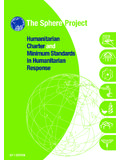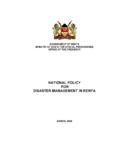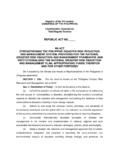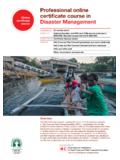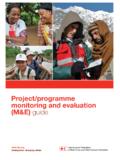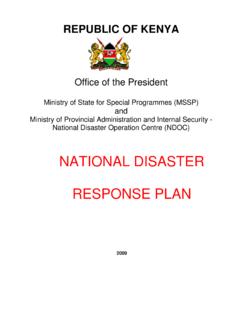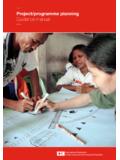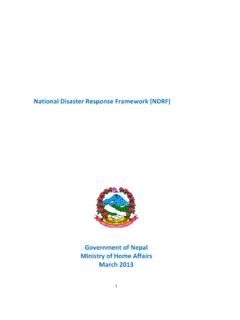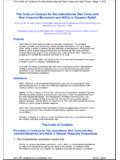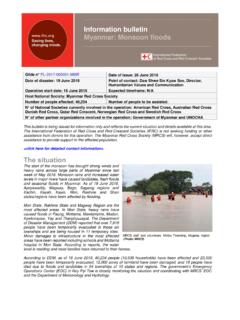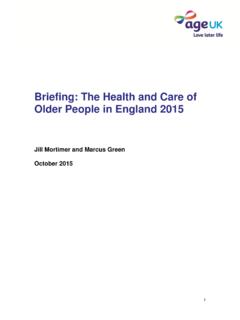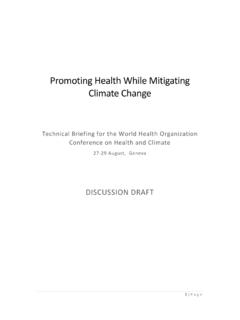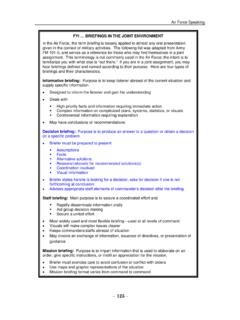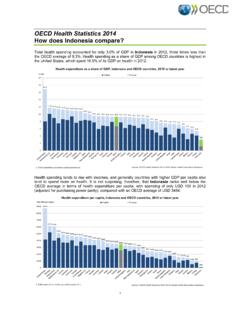Transcription of BRIEFING CHILD PROTECTION IN EMERGENCIES - …
1 BRIEFINGCHILD PROTECTION IN lives, changing : CHILD PROTECTION IN EMERGENCIES2 International Federation of Red Cross and Red Crescent Societies, Geneva, 2016 Any part of this publication may be cited, copied, translated into other languages or adapted to meet local needs without prior permission from the International Federation of Red Cross and Red Crescent Societies, provided that the source is clearly stated. Requests for commercial reproduction should be directed to the IFRC at photos used in this study are copyright of the IFRC unless otherwise Box 372CH-1211 Geneva 19 SwitzerlandTelephone: +41 22 730 4222 Telefax: +41 22 733 0395E-mail: : CHILD PROTECTION IN EMERGENCIES3 WHAT IS CHILD PROTECTION IN EMERGENCIES ?The inter-agency Minimum Standards for CHILD PROTECTION in Humanitarian Action defines CHILD PROTECTION in EMERGENCIES as: the prevention and response to abuse, neglect, exploitation, and violence against children in times of emergency caused by natural or manmade disasters, conflicts, or other crises.
2 1 This includes all forms of physical and psychological abuse, sexual and gender-based violence, and deprivation of basic IS THE AGE OF A CHILD ?According to international standards, the IFRC CHILD PROTECTION Policy defines the age of a CHILD as any person under the age of 18 ARE THE GLOBAL INTERAGENCY MINIMUM STANDARDS FOR CHILD PROTECTION IN EMERGENCIES ?The Minimum Standards reinforce children s specific rights as outlined in the UN Convention on the Rights of the CHILD and support the UN Sustainable Development an introduction to the Minimum Standards, visit the Alliance for CHILD PROTECTION in Humanitarian Action Youtube Page. WHAT ARE THE RELEVANT IFRC STRATEGIC FRAMEWORKS, POLICIES & MINIMUM STANDARDS?To view additional videos on specific Minimum Standards visit the website. IFRC Plan & Budget 2016-2020 IFRC Principles and Rules for Red Cross Red Crescent Humanitarian AssistanceIFRC CHILD PROTECTION Action Plan 2015-2020 BRIEFING : CHILD PROTECTION IN EMERGENCIES4 IFRC Minimum Standards for Gender and Diversity in EMERGENCIES and RecoveryIFRC Strategic Framework on Disability InclusionIFRC Strategy on Violence Prevention, Mitigation and ResponseIFRC Strategic Framework on Gender and Diversity IssuesWHAT ARE LOCAL CHILD PROTECTION LAWS?
3 For local CHILD PROTECTION laws from countries around the world, visit the CHILD Rights International Network (CRIN) legal more data on the status of children within specific EMERGENCIES and countries, see country profiles at the Alliance for CHILD PROTECTION in Humanitarian Action IS RESPONSIBLE FOR CHILD PROTECTION IN EMERGENCIES ?Every agency that responds to EMERGENCIES is responsible for ensuring that they meet the CHILD PROTECTION minimum standards. This includes the IFRC and all of its National Societies. The IFRC is a core member of the Inter-agency Alliance for CHILD PROTECTION in Humanitarian Action (formerly known as the CHILD PROTECTION Working Group ) that is responsible for the Minimum Standards for CHILD PROTECTION in Humanitarian Red Cross Red Crescent Movement calls upon States, National Societies, the International Federation and other relevant humanitarian and development stakeholders to ensure that their disaster and emergency management plans and activities include measures to prevent and respond to sexual and gender-based violence in accordance with their respective mandates, such as putting in place specific training for relevant emergency and disaster-response personnel, including the participation of women in disaster and emergency-response teams, and engaging community members, in particular women, in decision-making about disaster risk of the Red Cross Red Crescent Movement (2015) BRIEFING .
4 CHILD PROTECTION IN EMERGENCIES5 WHY IS CHILD PROTECTION RELEVANT IN EMERGENCIES ? The majority of people affected by EMERGENCIES are often are among the weakest, smallest, and most dependent populations in EMERGENCIES . The risks to children defined in the Minimum Standards for CHILD PROTECTION in EMERGENCIES include: physical, sexual, and psychological violence neglect injuries harmful practices including CHILD , early and forced marriage psychological distress and mental disorders children associated with armed conflicts and armed groups CHILD labour unaccompanied and separated children justice for children#1 MOS T AFFECTED POPULATION IN EMERGENCIESFACTORS THAT INCREASE THE RISK OF VIOLENCE AGAINST CHILDRENTOP RISKSS tatistics from locations from around the world have shown that the risk of violence against children during and after disasters can increase, even 50% 300%There is a consistent deprioritization of CHILD PROTECTION in humanitarian action, reported year on year by CHILD PROTECTION coordination groups and evidenced by statistics on funding and the funding of other research efforts in the humanitarian sector.
5 5 BRIEFING : CHILD PROTECTION IN EMERGENCIES6 Despite an overall growth in humanitarian funding, CERF funding for CHILD PROTECTION fell from US$ million in 2007 to US$ million in 2008, and then US$ million in In 2009, CHILD PROTECTION had the highest level of underfunding after the education $TRENDS Among the most neglected forms of CHILD PROTECTION in EMERGENCIES include CHILD -focused gender-based violence, trafficking and migration, and CHILD labour,8 and violence against children with NEGLECTED Research shows that the voices of children are often not heard and do not influence humanitarian decision-making. 9 CHILD PROTECTION in EMERGENCIES is considered a lifesaving intervention. 10 LIFE SAVINGBRIEFING: CHILD PROTECTION IN EMERGENCIES7 WHAT ACTIONS ARE NECESSARY, AND WHAT TOOLS ARE AVAILABLE?KEY ACTIONS BASED ON MINIMUM STANDARDSSAMPLE TOOLS AND ACTIONSRESOURCESAre all personnel briefed on CHILD PROTECTION requirements (responsibilities, reporting, mainstreaming)?
6 Is CHILD PROTECTION being included in relevant assessments?Ensure all personnel take the IFRC Online CHILD PROTECTION BRIEFING . Is a free course for Red Cross Red Crescent volunteers and staff. It is available in multiple languages. Provide a copy of the IFRC CHILD PROTECTION Policy to all not take pictures of children without their permission and from their interacting with children in ways that put them at risk. When privacy is needed, either a) go out of hearing but stay in sight of others, or b) follow the two deep rule ensure two staff or volunteers are present with the CHILD (best to have at least one person the same gender as the CHILD ).Use the IFRC Rapid Assessment Guide for PSS/VP in EMERGENCIES and Recovery. In assessments, make efforts to include children who can be socially excluded like girls and boys with disabilities, migrants, or those belonging to religious or ethnic minorities, Indigenous groups, and disaggregate data by age and the Canadian Red Cross Violence Prevention App for Disaster Responders that provides checklists for conducting assessments, integrating into various sectors like WASH, Health, Psychosocial Support, and Livelihoods, and background information on violence in EMERGENCIES .
7 It is available in multiple languages. The App is available for both iOS and Android (English, French). For the Spanish version, please change your device s language to all facilities are assessed to be safe and accessible for girls and : CHILD PROTECTION IN EMERGENCIES8 WHAT ACTIONS ARE NECESSARY, AND WHAT TOOLS ARE AVAILABLE?KEY ACTIONS BASED ON MINIMUM STANDARDSSAMPLE TOOLS AND ACTIONSRESOURCESAre children participating in assessments and implementation?What systems exist for reaching and supporting the most vulnerable children?Are personnel prepared and supported to respond to CHILD PROTECTION concerns?See samples in the Inter-Agency Study on CHILD Friendly Feedback and Complaint Mechanisms within NGO with schools to develop CHILD PROTECTION committees where girls and boys, parents, teachers, health care providers, police, and local NGOs can come together to identify priority PROTECTION needs and develop action plans to address the separated or unaccompanied children, implement Restoring Family Links (RFL) systems.
8 Ensure that the needs and capacities of children who may be socially excluded are part of assessments and planning. Partnerships with local or international agencies specializing in working with specific groups can be all personnel with a list of local referrals to respond to CHILD PROTECTION concerns. Referrals can often be accessed through local government authorities, NGOs, or CHILD PROTECTION /GBV/ PROTECTION /PSS handling disclosures of violence, refer to and be trained on the manual on Handling Disclosures of Sexual and Gender-Based the Where can concerns about CHILD PROTECTION be reported? section in this BRIEFING Note. Provide First Aid services to children and their : CHILD PROTECTION IN EMERGENCIES9 WHAT ACTIONS ARE NECESSARY, AND WHAT TOOLS ARE AVAILABLE?KEY ACTIONS BASED ON MINIMUM STANDARDSSAMPLE TOOLS AND ACTIONSRESOURCESAre adults and children being briefed about their rights to safety and rights to report any PROTECTION concerns?
9 Is CHILD PROTECTION being included as a cross-cutting theme in appeals and planning documents?Is there collaboration, where appropriate, with other agencies?Deliver the IFRC CBHFA Violence Prevention & Response activities on Psychosocial Support such as CHILD CHILD Friendly a specific budget line for CHILD a specific outcome/output/indicator on for CHILD local CHILD PROTECTION /GBV/ PROTECTION /PSS clustersCoordinate with local government agencies like schools, police, and health providers. Partner with NGOs, UNICEF, Save the Children, CARE, aligned with the Fundamental Principles, consider partnerships with faith-based ARE SAMPLE INDICATORS THAT CAN BE INCLUDED IN PROGRAM PLANNING?What are sample indicators that can be included in program planning?OUTPUT 1: IFRC and National Society volunteers, staff, contractors and consultants understand and formally agree to meet CHILD PROTECTION : Number of volunteers, staff contractors and consultants that are briefed on IFRC (or National Society) CHILD PROTECTION standards.
10 BRIEFING : CHILD PROTECTION IN EMERGENCIES10 WHERE CAN CONCERNS ABOUT CHILD PROTECTION BE REPORTED?Any concerns of violence against children should be reported as soon as possible. Personnel can report to their own line manager, a senior manager, Human Resources, or Safe Call Ltd (a confidential service for IFRC personnel): by phone: +442076965652; email: or website: WHERE CAN MORE INFORMATION BE ACCESSED?See the IFRC website for violence prevention and response for more information. Violence, while complex and frustrating, is not inevitable. In fact, like the risk of other public health crises, such as diarrheal diseases, respiratory illnesses, measles, malaria and lack of nourishment which can escalate in disasters, violence can be contained, curbed, and ultimately prevented. The ability of violence to thrive on ignorance, secrecy, denial and the chaos of disasters can be Advocacy Report: Predictable, Preventable OUTPUT 2: IFRC and National Society projects meet CHILD PROTECTION minimum standards to prevent and respond to physical, sexual and psychological violence and neglect against girls and boys.
